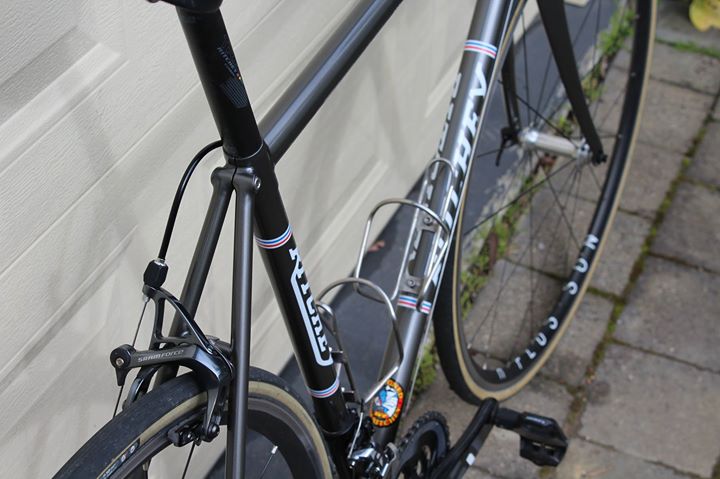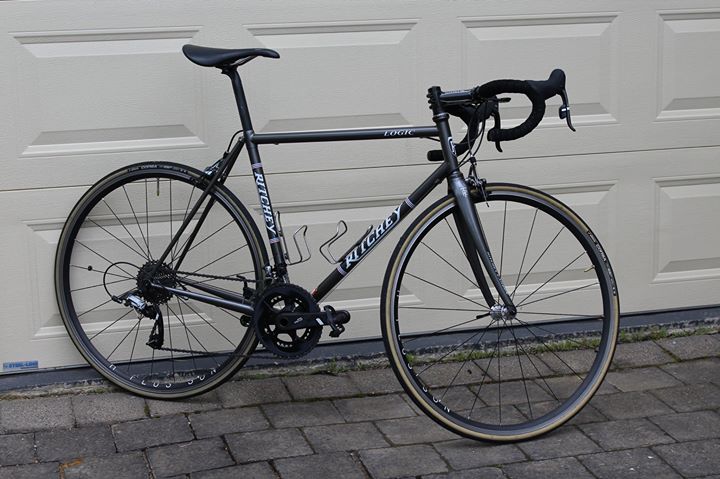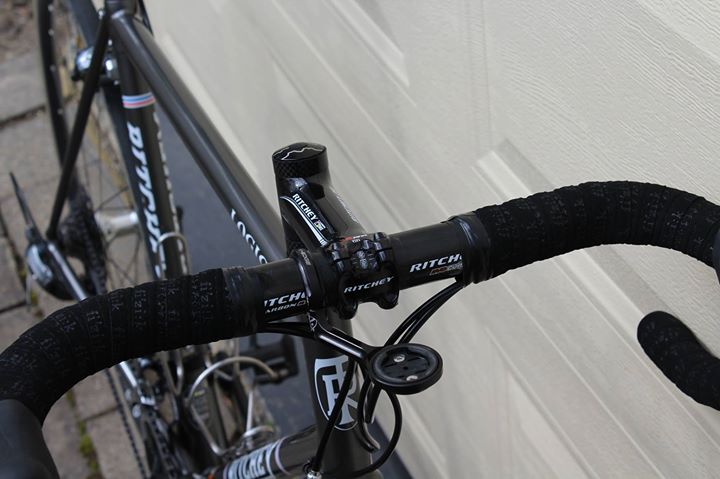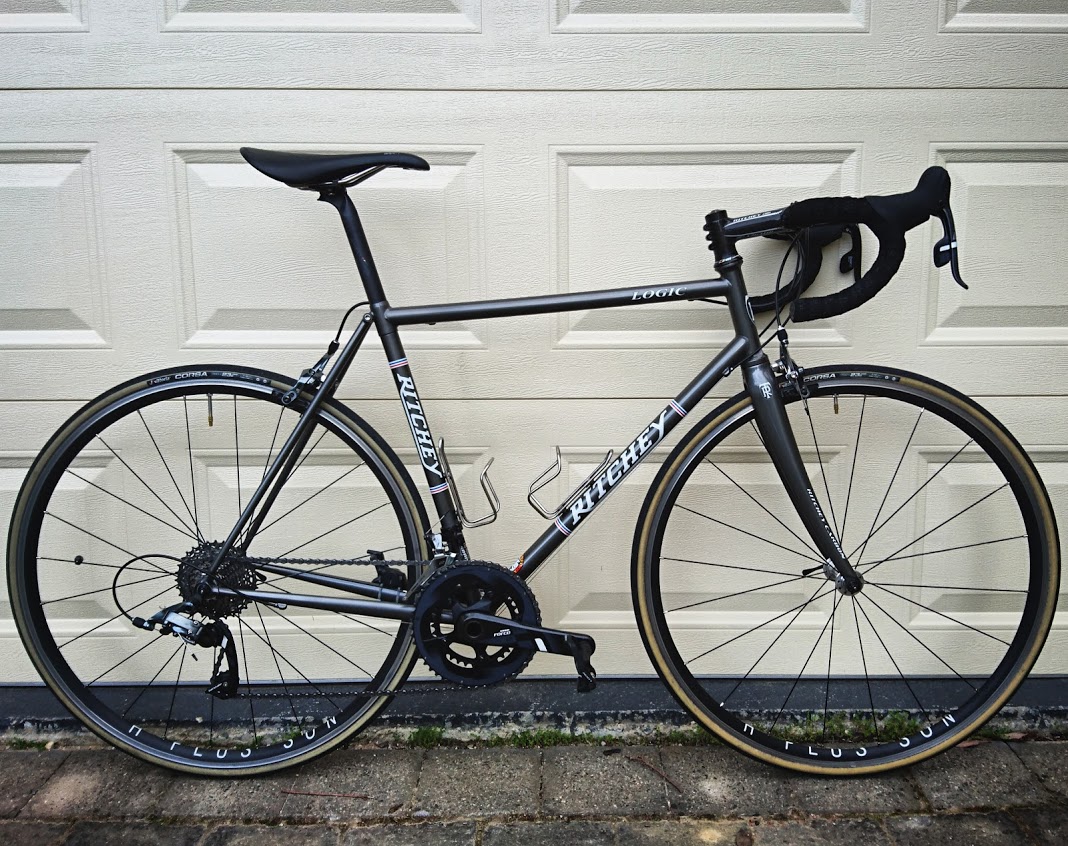Iain Treloar reports on a modern classic.
There are few bike manufacturers with the heritage or cred of Ritchey, a brand whose products are still developed and tested by one of the inventors of mountain biking – and a tech legend of the industry – Tom Ritchey. There’s a decent diversity to what Ritchey create, from bars, stems and posts, to wheels and tyres, to seats and cleats. But the heart of the brand has always been their small range of carefully-engineered, classic-looking frames.
The Road Logic 2.0 is a modern chromoly frame with a carbon fork, reinterpreting the original Road Logic and updating its technology into the 21st century. The tubing is custom-butted chromo exclusive to Ritchey, finished in a classy gloss charcoal and weighing in at a very respectable 1.79kg (55cm frame). The fork is colour-matched and full-carbon. The tasteful touches on the frame don’t leap out at you immediately, but the hourglass-shaped 1 1/8” headtube and distinctive integrated seat-post clamp at the top of the seat-stays are both elegant and functional, drawing you in and leaving you appreciative of the thought that went into their design.

Local distributor Dirt Works report that the Road Logic is popular with bike shop staffers, and there’s something that makes sense in that; it’s understated to the point that it probably wouldn’t stand out on the sales floor, but it’s lovely to work on and its technical details are appreciated by those in the know. External cabling and threaded bottom brackets aren’t particularly on-trend, but they work well, are easier to maintain and less prone to creaks and calamity.
The Road Logic’s narrow diameter tubing doesn’t scream speed in the way that a heavily-shaped carbon race frame does, but that belies its performance. It’s based around a reasonably aggressive, classic road race geometry, and the butting of the tubeset and material expertise of the builders creates ample stiffness through the bottom bracket, decent comfort and a lively, exciting ride quality. It’s lighter on its feet than the scales suggest it should be, climbs well and loses very little in performance compared to more expensive, more contemporary alternatives. Some slight torsional flex through the front end in hard efforts was the only indication I could pick up of lost efficiency, and a worthwhile trade-off when placed in the context of the well-mannered, beautifully-balanced whole.

The ride quality of a frame can live or die on the selection of components hanging off it, and in my testing of framesets I try to keep things as equal as possible for the purposes of comparison. This Road Logic was one of my personal bikes for slightly under six months, and was built up with a SRAM Force 22 groupset and H Plus Son Archetype/White Industries T11 wheels; a capable build and my usual baseline. The only issue this build uncovered was some limitations in tyre clearance; despite claimed clearance for “many 28c tyres”, 27c Challenge Paris Roubaix open tubulars were too close for comfort at the chainstay on these wide-ish rims, and even with 25c Vittoria Open Corsa Graphenes I experienced some scuffing to the underside of the fork in dirty/wet conditions. For the majority of tyres and wheels, clearance probably won’t be a problem at 25c, but given the increasing trend toward wider rims and fatter tyres, it’s something that Ritchey should look to update for future versions of the frame. Whilst the ride of the Road Logic isn’t harsh, a bit more cush through the tyres would have made it even more comfortable on longer days.
Other gripes from the build came with the Ritchey finishing kit, which – whilst functioning flawlessly when installed – is a bit of a pain to work on. I can best describe these components as overengineered. The stem seen here – a Ritchey Logic WCS 260 – uses three torx bolts at the steerer, a clamp that wraps 260 degrees around the bar – meaning you have to unwrap tape to the lever to get the bars on and off – and rearward facing bolts that were fiddly to get at. The bolts were of an uncommon T20 size, which added irritation in that the T20 bit is not commonly supplied with torque wrenches; you’re left crossing your fingers and hoping you don’t crush your bar or steerer when tightening.

Likewise, the seatpost head of the WCS Flex-Logic Trail post was pretty fussy to adjust, and left me wishing for something a little more straightforward. The major practical implication of these parts was to complicate adjustment – they would, for instance, ill-suit a travel bike. Of course, you can build the bike up with whatever components you like – the Road Logic is only sold in Australia as a frameset – but if you’re hoping to keep it matchy-matchy and any of my negative experiences with the Ritchey finishing kit sound like a red flag to you… well, they probably are. If you’re more inclined to set and forget, though, go for it.
When you’re out of the garage and on the road, however, all is forgiven; the Road Logic is a great-riding all-round road bike, reminding you of how good steel can be as a material. It’s easy to get caught up in the pursuit of lighter, stiffer, more exotic, carbon everything, electronic, hydraulic, etcetera – but an 8.something kilogram steel bike on alloy clinchers with a mechanical groupset can still be a bloody lovely thing. Sure, disc brakes and more tyre clearance would be handy, but there’s the recently announced Ritchey Outback for that (now, that’s a bike I can’t wait to get my hands on!). The Road Logic is more focused on a particular purpose, and excels at it.
It’s a bike that is elegant and understated, will scratch the itch of those looking for something a bit different from the cookie-cutter norm, and loses near enough to nothing in performance to its carbon rivals to be a complete non-issue. It’s also reasonably priced, beautiful looking and were it not for my endless upgrade fever and fussy fit, would be a bike I’d have held onto for the long haul. Well played, Tom Ritchey – I’ll miss this one.
Australian RRP: $1,899 (frame, fork, headset).
Build as pictured: $6,000ish
Function: 36/40
Quality: 38/40
Price: 9/10
Appearance: 9/10
92%
For more details, www.ritcheylogic.com
For purchase inquiries, www.dirtworks.com.au

